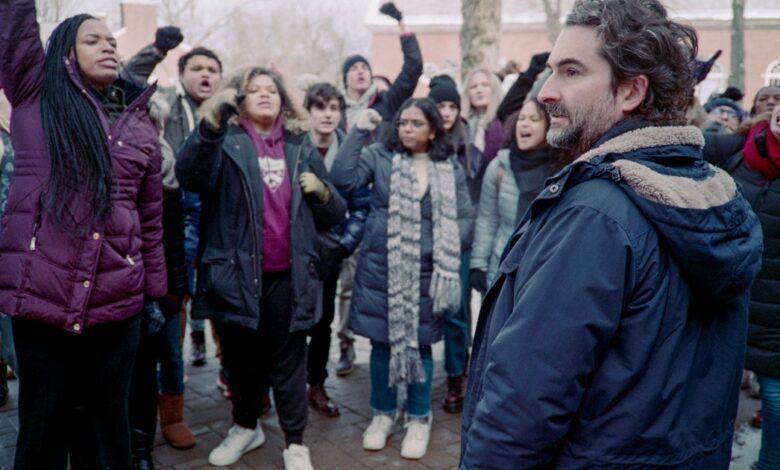Cancel Culture or Student Activism?

[ad_1]
You’re reading a recap of Episode 2 of the Netflix series The Chair with the writers Alison Kinney, Grace Lavery, Dan Sinykin, and Rebecca Wanzo. Find our other episode recaps here.
The following has been edited for length and clarity.
Rebecca: I love that moment in the episode when Ji-Yoon is walking across campus and there’s this slight smile on her face. It’s a beautiful day, she has all these plans, and her personal life may be taking a good turn. Haven’t many of us who have won the tenure-track-job sweepstakes experienced this? We have that rare moment when we think, “Aren’t I lucky? I’m doing what I wanted to do on this beautiful campus and love all the things!” And then some departmental mess just snatches all that joy.
Bill’s storyline is painfully believable. Obviously, that offhand Nazi salute to describe a moment in history was a bad idea. He was thoughtless and unapologetically so. But his students know he’s not a Nazi, right? They’re not leaving the classroom in outrage. I’d like to think a popular teacher would have enough good will that somebody would counter the narrative that he was a Nazi, but I fear that things could go down in exactly this way. It’s also important to consider the Nazi salute as narrative choice, given the weird place it occupies in relation to progressive and conservative politics. In the last few years, we have had a rising and unapologetic defense of white supremacy nationally and globally At the same time, conservatives often accuse progressives who support Palestinians of anti-Semitism. So Bill as meme conveniently serves as enemy for lots of people. This was not a writing accident.
Dan: Yes! To all of this. On the one hand, I, too, fear that this is an all-too-plausible scenario, that a student might pull Bill’s unfortunate, spontaneous, and critical Nazi salute out of context, dress it up with filters, and instigate some outrage. On the other hand, I fear that the show is engaged in a bad-faith depiction of undergraduate activism, joining the pile-on of pundits who declaim the thin skin of students today, rather than recognize the patient and deliberate organizing students do on behalf of, say, combating climate change or the Israeli occupation.
Alison: Regarding manufactured outrage … I think it’s legit for students to be hurt and offended by this. Students of color don’t tend to amass demonstrations against faculty members unless there is a long and egregious history of prior misconduct. So if anybody’s manufacturing outrage here, it’s the show’s writers.
Rebecca: As we go on, we see an affirmation of many of the points students make about the university. Both things can be true. They are the righteous defenders of a better future that we were unable to obtain, and sometimes some of them (like many people in the rest of the world) may choose to exile people over things that warrant different solutions. One of the ugliest lies told by people opposed to current forms of student activism is the idea that there is an exceptional intolerance among progressives that cannot be found anywhere else in the culture. But you’re right, Dan, this can come off simply as a bad-faith depiction of student activism. So much of this show is about generational conflict, though — I read Joan’s chastising of the Title IX coordinator last episode a bit differently. You interpreted it as sexist. I read it as a generational conflict between feminists.
Dan: I like your reading of the moment between Joan and the Title IX coordinator, Rebecca, better than mine. I just rewatched Episode 2, and came here to say (1) because I haven’t said it yet, Sandra Oh is superb (have you all read Summer Kim Lee’s brilliant essay about her?); (2) more slapstick when the car rolls over Bill’s foot, which is also a fun little way to prolong the night’s sexual tension; (3) boy, did I cringe at Bill’s When Harry Met Sally moment at the end of the episode, when he rushes to Ji-Yoon’s office — having realized that he needs her — to declare that he could be an “asset” and a “value-add.” Blegh! Not cute, Dobson!
Grace: Oh God, do we have to have opinions about cancel culture? Please, dear God, no. Is this going to be on the exam? OK, then, to say something obvious, the notion that an entire generation of people are so perma-triggered that they would demand, en masse and at once, the resignation of a popular white man on the basis of a clumsily edited, out-of-context clip of him saying “Heil Hitler” during a discussion of literary modernism is utterly improbable, as well as grotesquely insulting to a generation of students who have experienced firsthand the electoral triumphs of fascism and white supremacy in the United States.
This is the kind of paranoid fantasy that a Fox News host cynically spins, and that a small group of mystified white, ex-liberal Gen X-ers have leveraged into lavish Substack revenues. For both of those groups, contempt for the under-40s is a sine qua non and the basis of any and every political analysis. I have no idea what this fantasy is doing in a cheerful Netflix dramedy whose apparent appeal is to millennial girl bosses, whose political identities (and, by extension, micro-demographic marketing tranches) are no less completely shaped by anti-anti-wokeness … unless the sneering contempt with which students are treated by the dominant class — especially queer and trans students, and students of color — passes by unnoticed even in Netflix pitch meetings.
Dan: You’ve pinpointed the problem. What is this fantasy doing here? I think it’s more intentional than you’re suggesting. It’s not just slipping by Netflix’s quality control because it’s dominant-class common sense.
Rebecca: Most people will agree with the three of you that this is just a Fox News fantasy of student outrage. But I work on “bad” humorous objects, and have a slightly more generous reading. Grace asks, Why is this here from (possibly) feminist producers? While you may feel this is punching down and not punching up, this series is trying to address how people read each other in the academy, how generational conflict occurs, how even people of good faith can struggle with each other. You might be surprised by how many conflicts you end up negotiating, as chair, that center on how students and faculty read each other, sometimes in ugly ways. Given that comedy is about excess, I would suggest that we not be oversensitive about a joke about sensitivity.
So I don’t read the Bill plotline as a fantasy. I read it as an anxiety — a classic sitcom set-up that ratchets up the stakes from a ridiculous scenario. I have no take on “cancel culture” because I think the phrase has been emptied out of any substantive intellectual meaning, but I think it’s important to talk about what the series puts in front of us. We have true believers on this campus — faculty and students — who desire something better. What prevents — and here’s a controversial, old-fashioned term, perhaps revealing some generational gaps in this exchange — solidarities around the students being heard, faculty being valued, and the humanities being “saved” (or at least not gutted and dismissed by deans)? I’m a bit too much of a Birmingham School girl to dismiss the show as having simplistic politics.
Grace: What do any of these people want, in the end? “The department’s hanging on by a thread,” says the dean, who also talks about “re-envisioning the humanities.” Re-envisioning them, we are encouraged to think, as something that does not exist. Perhaps Yaz wants to correct Dean Larson on his quotes from A Midsummer Night’s Dream: satisfying, to be sure. Elliot wants his time in the archives — “it’s remarkably peaceful there” — which is to say, I suppose, that he craves the sweet embrace of the grave. In any case, the question would be not how to re-envision the humanities, but why to bother. What, in The Chair, is really worth saving?
Dan: It sometimes feels as if the show is lulling us into wishing a final farewell to these lovable anachronisms, whose discipline seems to have nothing to offer a world that has — Bill included — succumbed to the sovereignty of the dollar, the asset, and the value-add.
[ad_2]
Source link







